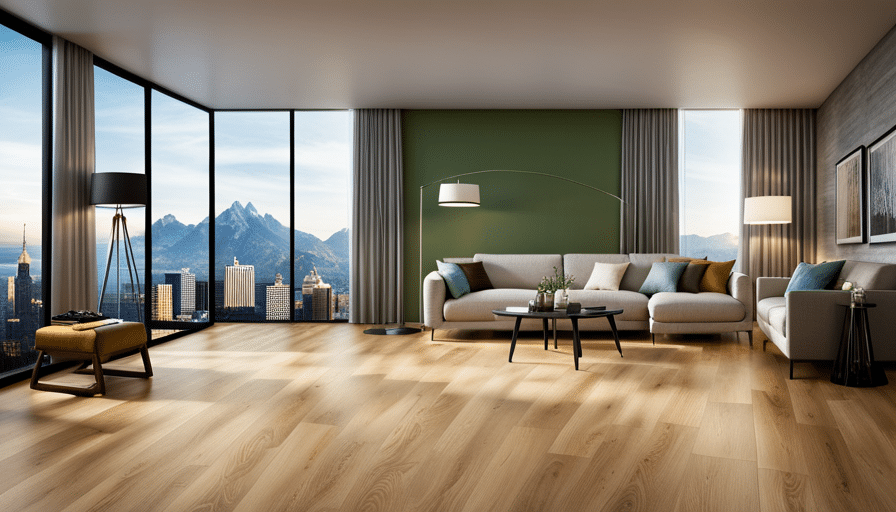Vinyl plank flooring has gained popularity in recent years due to its durability, affordability, and aesthetic appeal. However, many homeowners are curious about the lifespan of this type of flooring. Understanding the factors that affect the longevity of vinyl plank flooring is essential for making informed decisions about installation and maintenance.
Proper installation techniques play a crucial role in the lifespan of vinyl plank flooring. When installed correctly, the flooring can withstand heavy foot traffic and daily wear and tear. Maintenance and cleaning also play a significant role in preserving the flooring’s lifespan. Regular cleaning and proper care can prevent scratches, stains, and other forms of damage.
The wear layer thickness and quality of the vinyl planks are vital factors in determining how long the flooring will last. A thicker wear layer provides better protection against wear and tear, making the flooring more resilient and durable.
Environmental factors can also impact the longevity of vinyl plank flooring. Exposure to sunlight, humidity, and moisture can cause the flooring to deteriorate over time. Therefore, it is essential to consider these factors when choosing vinyl plank flooring for specific areas of the home.
Knowing the signs indicating the need for replacement is essential. As vinyl plank flooring ages, it may show signs of wear, such as cracking, peeling, or an uneven appearance. Identifying these signs will help homeowners determine when it is time to replace the flooring.
By understanding these factors and taking appropriate measures, homeowners can ensure the longevity of their vinyl plank flooring and enjoy its benefits for years to come.
Key Takeaways
- Vinyl plank flooring can last 10 to 20 years or longer with proper care and maintenance.
- The wear layer thickness and quality of the vinyl planks impact the longevity and durability of the flooring.
- Environmental factors such as sunlight, humidity, and moisture can affect the lifespan of vinyl plank flooring.
– Signs indicating the need for replacement include cracking, peeling, and an uneven appearance.
Factors Affecting the Lifespan of Vinyl Plank Flooring
The lifespan of vinyl plank flooring is influenced by various factors that should be considered. Durability factors play a significant role in determining how long vinyl plank flooring will last. These factors include the quality of the material used, the thickness of the wear layer, and the overall construction of the flooring. Higher-quality materials and a thicker wear layer tend to result in a longer lifespan.
Additionally, the installation process can also impact the durability of the flooring. Proper installation techniques, such as ensuring a flat and level subfloor, can help prevent premature wear and damage. Regular maintenance, such as cleaning and avoiding excessive moisture, can also extend the lifespan of vinyl plank flooring.
Overall, with proper care and maintenance, vinyl plank flooring can last anywhere from 10 to 20 years, although some high-quality options may last even longer.
Proper Installation Techniques
When considering the durability and lifespan of vinyl plank flooring, it is crucial to ensure that proper installation techniques are employed.
Common installation mistakes can significantly impact the longevity of vinyl plank flooring. One common mistake is improper subfloor preparation, which can lead to uneven surfaces and ultimately cause the vinyl planks to warp or buckle over time.
Another mistake is failing to acclimate the planks to the room’s temperature and humidity levels before installation, which can result in expansion or contraction of the material.
Additionally, inadequate adhesive application or improper seam sealing can lead to water damage and reduce the lifespan of the flooring.
On the other hand, professional installation offers several benefits. Professionals have the experience and expertise to avoid these common mistakes and ensure a proper installation, thereby maximizing the lifespan of vinyl plank flooring.
Maintenance and Cleaning Tips
To ensure the optimal condition and appearance of vinyl plank flooring, it is essential to follow proper maintenance and cleaning techniques. Vinyl plank flooring is relatively low-maintenance, but regular cleaning is necessary to prevent dirt, dust, and debris from accumulating and causing damage.
Cleaning methods for vinyl plank flooring include sweeping or vacuuming with a soft brush attachment to remove loose particles. For tougher stains or spills, a damp mop with a mild detergent solution can be used. It is important to avoid using abrasive cleaners, wax-based products, or excessive water, as these can cause discoloration or damage to the flooring.
Recommended products for cleaning vinyl plank flooring include pH-neutral cleaners specifically designed for vinyl or laminate floors. These products effectively remove dirt and grime without leaving behind any residue or dulling the surface.
Following these cleaning techniques and using suitable products will help extend the lifespan of vinyl plank flooring and maintain its original appearance.
Wear Layer Thickness and Quality
A crucial factor to consider when evaluating vinyl plank flooring is the thickness and quality of its wear layer. The wear layer serves as a protective barrier between the vinyl plank and daily wear and tear, making it essential for ensuring the longevity of the flooring.
A thicker wear layer generally indicates higher durability and resistance to scratches, stains, and fading. It can withstand heavy foot traffic and is more likely to last longer compared to a thinner wear layer.
However, it is important to note that the thickness of the wear layer also affects the cost of the vinyl plank flooring. A thicker wear layer tends to be more expensive, so it is necessary to strike a balance between wear layer durability and cost considerations when making a purchasing decision.
Environmental Factors and Impact on Longevity
Environmental factors can significantly impact the durability and lifespan of vinyl plank flooring. Climate conditions play a crucial role in determining how long vinyl plank flooring will last. Extreme temperature variations, high humidity levels, and excessive moisture can cause the planks to expand, contract, and warp over time, leading to premature wear and tear.
Additionally, UV exposure can also affect the lifespan of vinyl plank flooring. Prolonged exposure to sunlight can cause the color of the planks to fade, and the protective wear layer to degrade, making them more susceptible to scratches and stains.
Therefore, it is important to consider these environmental factors when choosing vinyl plank flooring and take appropriate measures to mitigate their impact, such as maintaining consistent indoor climate conditions and using window coverings to reduce UV exposure.
Signs it’s Time to Replace Your Vinyl Plank Flooring
One indication that it may be time to replace your vinyl plank flooring is when you start to notice significant wear and tear, such as cracks, chips, or peeling edges. Over time, vinyl plank flooring can experience degradation due to various factors, including foot traffic, furniture movement, and exposure to sunlight and moisture. These factors can cause the protective wear layer to wear down, leading to visible signs of damage.
Cracks and chips can appear on the surface, compromising the structural integrity of the flooring. Additionally, peeling edges or corners can create tripping hazards and allow moisture to seep underneath, potentially causing further damage. Replacing the flooring at this stage is crucial to maintain a safe and aesthetically pleasing environment.
Regular inspection and maintenance can help identify signs of wear early on and prevent further deterioration.
Frequently Asked Questions
Can vinyl plank flooring be installed in wet areas such as bathrooms or laundry rooms?
Vinyl plank flooring is suitable for wet areas such as bathrooms and laundry rooms due to its water-resistant properties. It can also be installed in kitchens and basements, providing a durable and low-maintenance flooring option.
Are there any specific cleaning products or solutions that should be avoided when cleaning vinyl plank flooring?
Avoid using abrasive cleaners, ammonia-based products, and wax or polish on vinyl plank flooring. To remove tough stains, use a mixture of warm water and mild dish soap. Gently scrub the area with a soft cloth or mop.
Can vinyl plank flooring be installed over existing tile or hardwood floors?
Vinyl plank flooring can be installed over existing tile or hardwood floors with proper preparation. The installation process involves cleaning, leveling, and applying an adhesive. Vinyl plank flooring offers benefits such as durability, easy maintenance, and a wide range of design options compared to other flooring types.
How often should I reapply a protective coating or sealant to my vinyl plank flooring?
The reapplication frequency of a protective coating or sealant to vinyl plank flooring depends on factors such as foot traffic and environmental conditions. Regular reapplication provides benefits such as enhanced durability, stain resistance, and prolonged lifespan of the flooring.
Are there any specific precautions I should take to protect my vinyl plank flooring from furniture scratches or heavy foot traffic?
To protect vinyl plank flooring from furniture scratches, use felt pads or furniture glides. For heavy foot traffic, place rugs or mats in high traffic areas. Regularly clean and maintain the flooring to prolong its lifespan.
Conclusion
In conclusion, the lifespan of vinyl plank flooring is influenced by several factors.
Proper installation techniques, such as ensuring a smooth and level subfloor, can enhance its durability.
Regular maintenance and cleaning, using appropriate products and techniques, can also prolong its lifespan.
The thickness and quality of the wear layer are crucial, as a thicker and higher-quality wear layer can provide better protection against scratches and wear.
Additionally, environmental factors, such as exposure to sunlight and moisture, can impact the longevity of vinyl plank flooring.
Recognizing signs of wear and damage is important in determining when it is time to replace the flooring.


